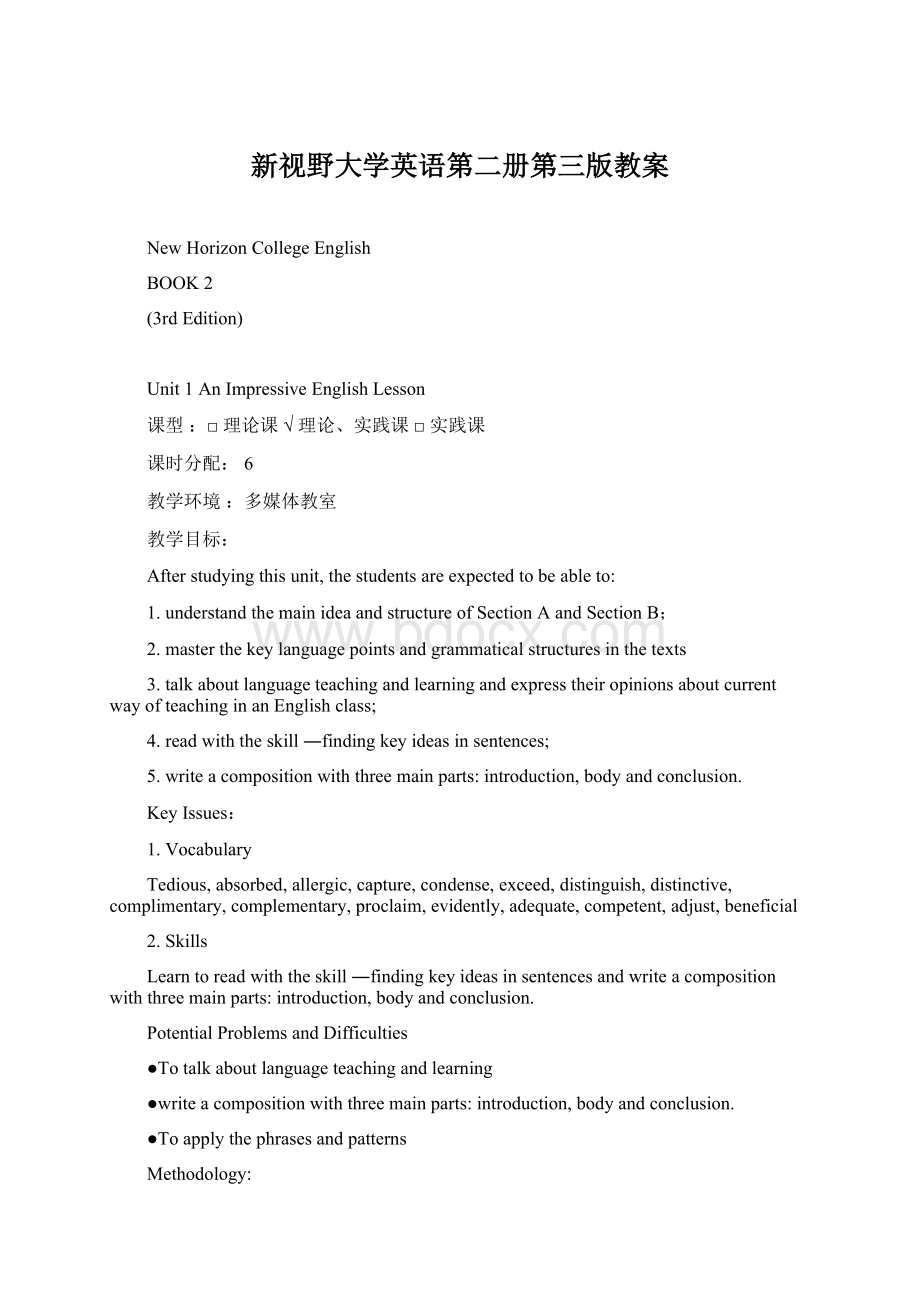新视野大学英语第二册第三版教案.docx
《新视野大学英语第二册第三版教案.docx》由会员分享,可在线阅读,更多相关《新视野大学英语第二册第三版教案.docx(69页珍藏版)》请在冰豆网上搜索。

新视野大学英语第二册第三版教案
NewHorizonCollegeEnglish
BOOK2
(3rdEdition)
Unit1AnImpressiveEnglishLesson
课型:
□理论课√理论、实践课□实践课
课时分配:
6
教学环境:
多媒体教室
教学目标:
Afterstudyingthisunit,thestudentsareexpectedtobeableto:
1.understandthemainideaandstructureofSectionAandSectionB;
2.masterthekeylanguagepointsandgrammaticalstructuresinthetexts
3.talkaboutlanguageteachingandlearningandexpresstheiropinionsaboutcurrentwayofteachinginanEnglishclass;
4.readwiththeskill―findingkeyideasinsentences;
5.writeacompositionwiththreemainparts:
introduction,bodyandconclusion.
KeyIssues:
1.Vocabulary
Tedious,absorbed,allergic,capture,condense,exceed,distinguish,distinctive,complimentary,complementary,proclaim,evidently,adequate,competent,adjust,beneficial
2.Skills
Learntoreadwiththeskill―findingkeyideasinsentencesandwriteacompositionwiththreemainparts:
introduction,bodyandconclusion.
PotentialProblemsandDifficulties
●Totalkaboutlanguageteachingandlearning
●writeacompositionwiththreemainparts:
introduction,bodyandconclusion.
●Toapplythephrasesandpatterns
Methodology:
Acombinationoftraditionalteachingmethodswiththecommunicativeapproachwillbeadopted.Specialattentionshouldbepaidtoclassroominteractionlikequestioningandanswers.Smallgroupworksarealwaysneededwhilediscussingthequestionsandthedifficulttranslationpractice.Moreencouragementisneededandmoreguidancewillbegivenintheirextracurricularstudy.
TeachingAids:
Visualaids,projector,stereoandmicrophone
Groupworkandpairwork
ConductofTasksandActivities
(师生互动方式ModeofInteraction;学习策略LearningStrategies)
Students-centered,Task-basedteachingandlearning
TeachingProcedures
Step1Lead-in
I.Greetingandwarming-upquestionsdiscussion.
1.WhatarethekeyfactorsthathelppeoplelearnEnglishasaforeignlanguage
2.DoyouhaveanyprobleminEnglishlearning
3.DoyouthinkgrammarisimportantinEnglishlearning
II.Listeninganddiscussing.
1.Listeningpractice.
2.Inyouropinion,whatisthemosteffectivewaytolearnEnglish
III.Listeningtoatalkandanswerquestionsonpage2
Step2SectionAAnImpressiveEnglishLesson
I.CulturalbackgroundAmericanuniversityeducation
isCommunicativeLanguageTeaching
Atypeofteachingmethod;
Developthecommunicativeabilityaswellastheknowledgeofgrammar;
Learningbydoing;
Makeclassroomsituationofrealforeignlanguageenvironment.
2.WhatarethefeaturesofCommunicativeLanguageTeaching
Communicativecompetenceisthegoal;
Anintegrationofgrammaticalandfunctionalteaching;
Accuracyissecondarytoconveyingamessage;
Focusoncommunicativeandcontextualfactorsinlanguageuse;
Learner-centeredandexperience-based.
3.WhatistheroleofteacherinCommunicativeLanguageTeaching
Afacilitatorofstudents’learning;
Amanagerofclassroomactivities;
Anadvisorofstudents’questions;
Aco-communicatorinthecommunicativeactivity.
II.LanguagePoints
Wordsandexpressions
1.oddity:
n.[C]astrangeorunusualpersonorthing怪人;怪物;奇特的东西Withhisneatsuitson,hefeltlikeanodditywalkinginthispoorneighborhood.穿着笔挺的西装走在这个贫民区里,他觉得自己就像个怪物。
2.oblige
Thewordobligeismostcommonlyusedintheexpressionbe/feelobliged.1)be/feelobligedtodosth.指“感到有责任做某事”。
例如:
Hefeltobligedtohelphismother,evenifitmeantleavingcollege.他觉得有责任帮助母亲,即使这意味着他要离开大学。
2)be/feelobligedtosb./sth.指“对某人或某事心存感激”。
例如:
Thankyouverymuch,doctor.Iamextremelyobligedtoyou.医生,非常谢谢您。
对您,我深表感谢。
3.Howwasit(spoken)oftenusedinconversationtoasksb.abouttheiropinionorexperienceofsth.怎么样(口语常用表达,用于询问看法或经历)DidyouwatchthemovielastnightHowwasit你昨天晚上看那部电影了吗感觉怎么样
IwastoldthatyouhadtraveledtomanyplacesinAsiarecently.Howwasit有人告诉我你最近跑了亚洲的很多地方,旅行怎么样
4.fullof:
(followedbyabstractnouns)feelingorshowingalotofparticularemotionorquality(感觉、表达或表现出)充满某种情感(特质)的fullofexcitement/energy/hope/happiness/praise充满兴奋/活力/希望/幸福/赞美Theteacherwasfullofpraiseforthehomeworkthatthestudentshaddone.老师对学生们完成的功课赞不绝口。
Lucyisahappychildandalwaysfulloflife.露西是个快乐的孩子,总是充满了活力。
5.“Itwas,like,whoa!
”means“Itwasreallygreat!
”.“Itwaslike…”isaninformalexpressioninconversation,verycommonforyoungpeoplewhoarelazyandincapabletoreferencetheirideas.
Theexpressionisusuallyfollowedbyanadjectiveoranexclamation.Itwas,like,marvelous!
简直奇妙极了!
(Itwaslike)Whoa!
Howcomeyougotahundredpercentcorrectonsuchahardtest哇!
这么难的考试你怎么都全答对了
Note:
Whoaisspecificallyusedtoshowthatpeoplearesurprisedorthinksomethingisveryimpressive.Itcanbeusedindifferentcontexts.Forexample:
﹒
Todescribesomethingthatyou’renotquitesurehowtodescribe:
Thatcarissocool,it’slike,whoa.
Toexpresssurprise:
Whoa!
It’sreallyamazing!
Toindicateadesiretoendwhatsomeoneistalking:
Whoa,OK,that’senough.
6.Andthatwasit.(Para.4)
Meaning:
Andthatwaseverythingshesaid,withoutevenmentioninganydetailsofherwonderfulexperienceinEurope.
Thatwasit.:
oftenusedinconversationtosaythatsth.iscompletelyfinishedorthatasituationcannotbechanged就这样(指某事彻底结束或形势不能更改)
Thatwasit.Icouldnolongerhopeforapromotion,andmybossdidn’tevenwanttoseemeagain.就这样吧,我的升职再也没指望了,我的老板甚至不想再见到我。
That’sit.Thereisnothingmorewecando.就这样吧,我们也再没有别的办法。
7.distinguished,distinctive,distinct
这三个词词形相近,但意思有很大的差别,不能互换使用。
1)distinguished指“卓越的;杰出的;著名的”。
例如:
Hisgrandfatherhadbeenadistinguisheduniversityprofessor.他的祖父曾是一位杰出的大学教授。
2)distinctive指“(特征、性格或外表)独特的,有明显不同的”。
强调“表示差别的”、“有特色的”、“特殊的”。
例如:
Irenehadaverydistinctivevoice.艾琳有一个非常独特的声音。
Canyoufindthedistinctivewatermarksofthisstamp你能看到这枚邮票上明显的水印吗PupilsinHongKongusuallyhavedistinctivebadgesontheirschooluniforms.在香港,小学生的校服上常戴有颇具特色的徽章。
3)distinct表示“分明的;明了的;清楚的”。
例如:
Ihavethedistinctfeelingthatmyfrienddidnotrealizewhatwashappening.我明显感到我朋友并未察觉所发生的一切。
ThephotoyoutookinHongKongCulturalCentreisnotdistinctenough.你在香港文化中心拍的那张照片不够清晰。
Shehasadistinctpronunciation.她的发音清楚。
Thereisadistinctsmellofsmokeinmyroom.我的房间里有一股明显的香烟味。
distinct的另一个词义是“明显不同的;有区别的”。
例如:
Ourinterestswerequite
distinctfromthoseofthem.我们的兴趣与他们的兴趣截然不同。
现将distinct和distinctive用在一个句子里,以便区分:
Oneofthedistinctivefeaturesofthisbookisitsdistinctillustrations.这本书很明显的特点之一就是其具有清楚明了的图解。
8.proclaim,claim
1)proclaim是正式宣告或公开宣告,“宣告”的中文意思比“声明”要严肃。
例如:
Thegovernmenthasproclaimedanewlaw.政府已公布了一项新法令。
Theyproclaimedthathewasatraitor.他们宣称他是叛徒。
Theringingbellsproclaimedthebirthoftheprince.响亮的钟声宣布了王子的诞生。
2)claim是根据权利声明,根据权利要求索赔,根据权利认领。
(1)声称;断言;主张。
例如:
Theyclaimtohavediscoveredacureforthedisease.他们声称已经发现了治疗此病的方法。
Sheclaimedthattheringwasstolen,notlost.她声言那只戒指是被偷的,而不是遗失的。
(2)要求;索赔。
例如:
Theoldmanclaimedtheland.老人要求得到这块土地。
Iclaimpaymentfrommyfriend.我要求我的朋友付款。
是动词expose的名词形式,动词expose常用于短语be/getexposedto中,表示“接触;体验”。
例如:
Somechildrenareneverexposedtoclassicalmusic.有些孩子从来没有接触过古典音乐。
Havingbeenexposedtoallkindsofdangersintheforest,thegirlfelthelplessandbegantocry.那个女孩在森林里体验了各种危险后,感到很无助,就哭了起来。
10.adequate,abundant
1)adequate表示“在数量或质量上足以满足特定的标准”,强调刚好够用、没有多余。
例如:
Hedoesn’tearnalargesalarybutitisadequateforhisneeds.他挣钱不多,但也够用了。
2)abundant表示“充裕;绰绰有余”,强调数量很多或充足有余。
例如:
Wehaveabundantproofofhisguilt.我们有他犯罪的充分证据。
Collocationnote:
InParagraph7,wehavetwocollocationpairswiththesameword:
advanced/propervocabularyforourattention.
11.adjust,adapt
1)当表示“适应…环境”时,adjust和adapt差不多。
常与to搭配。
可以说adjust(sth./oneself)tosth.和adapt(sth./oneself)tosth.。
其中adjust和adapt互为同义词。
例如:
OnceyougettotheUnitedStates,youwillhavetoadjustyourselftoacompletelynewlifestyle.一旦你到了美国,你就需要进行调整,以适应美国全新的生活方式。
Thechildrenfoundithardtoadapttothenewschool.这些孩子们发现很难适应这所新学校。
Thebodyadjustsitselftochangesoftemperature.身体会自行适应温度的变化。
Intelligenceseekstograsp,manipulate,re-order,andadjust,whileintellectexamines,ponders,wonders,theorizes,criticizesandimagines.智力寻求的是理解、运用、整合和调节,而才学是审视、思考、探究、形成理论、批判和想象。
2)adjust作及物动词用时,还有“调节;使…适合;校准”之意,而adapt不表示此意。
例如:
adjustaradio(dial)调准收音机的选台指针adjustcoloronaTV调整电视的色彩adjustone’stieinamirror照镜子整理领带adjustatelescopetoone’seyes调节望远镜使之适合眼睛观看adjustaclock调准时钟
3)adapt作及物动词时,还有“(改装)使适合;改编”之意,其同义词是modify,不是adjust。
例如:
Theseteachingmaterialscanbeadaptedforolderchildren.这些教材修订一下可以给大一点的孩子用。
Headaptedhisoldcarenginetotheboat.他把他的旧汽车上的引擎用到那只船上。
12.beneficial常与to连用,引出对谁有利、有帮助、有用。
例如:
Cyclingishighlybeneficialtohealthandtheenvironment.骑自行车对身体和环境都大有裨益。
Collocationnote:
InParagraph7,wehavecomeacrosscompetentcommunicationandherewehaveprecisecommunicationandbeneficialcommunication.InParagraph2ofTextBcarefulreaderswillnotmissadequatecommunicationskills.Formorecollocationpairs,pleaserefertothenotesoncollocationforthisunit.
Usefulexpressions
PracticalPhrases
1.be/feelobligedtodosth.(因形势、法律、义务等等关系而)非做不可,迫使
2.freshfrom刚从„„来的;刚有„„经历的
3.distinguishbetween区分;辨别
4.get/feel/belost迷惘;困惑;不知所措
5.lookuponsb/sth.As把某人/物看作
6.beequippedwithsth.以„„为装备;配备
III.FunctionalPatternsandFunctions&Usages
sb/sth.do/issth.,thenperhaps…用于表述“在特定条件下可能发生的事情”。
2.sbfailtodosth….,whilesbshoulddosth….用于表述“实际情况与预期的反差”。
3.Whilesth./sbis/does…,sb/sth.elseis/dos…用于表述“人与人之间或事与事之间的反差”。
StepThreeLanguageapplication45minutes
1.Writingdev